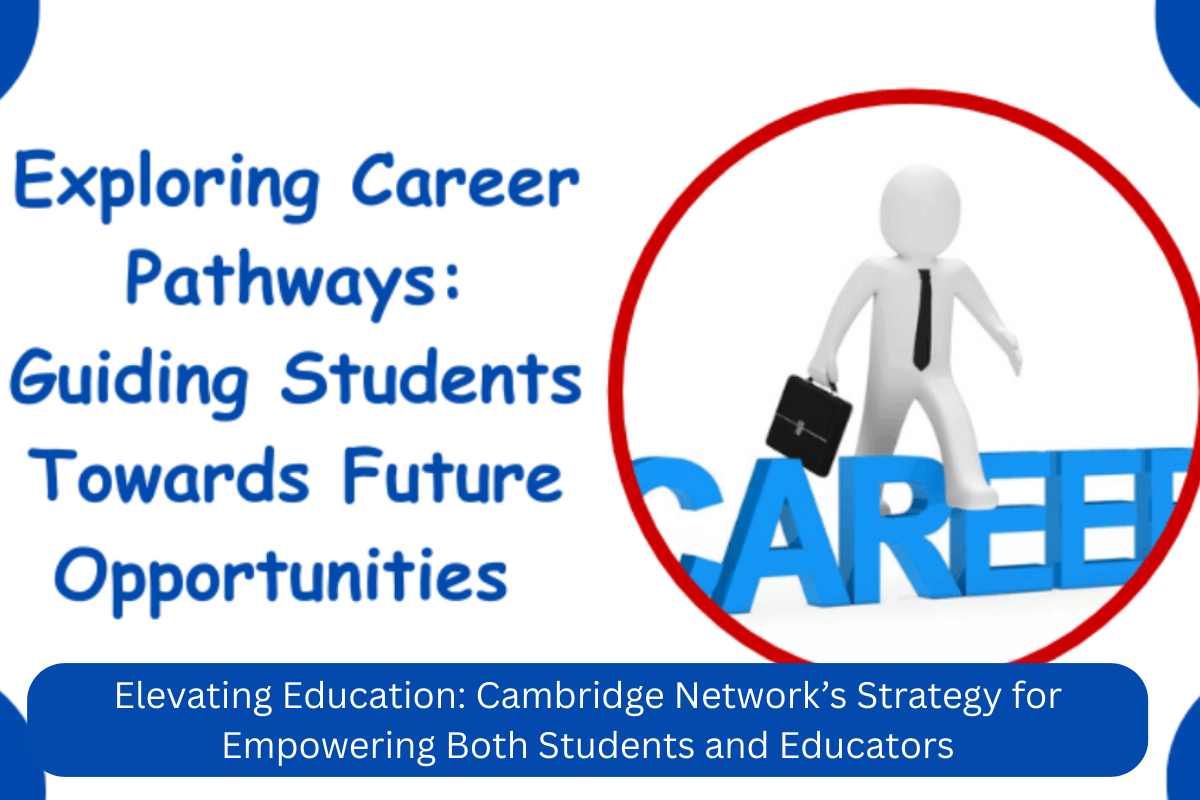Choosing the right career path is one of the most important decisions a high school student will ever make. With a wide array of options available, students may feel overwhelmed or unsure about which direction to pursue. Cambridge Network understands the importance of early career exploration and is committed to helping high school students make informed decisions about their futures. Through its Comprehensive Guide for Career Pathways, Cambridge Network provides students with the resources, support, and guidance they need to navigate the process of career exploration and discover a path that aligns with their interests, skills, and goals.
Why Career Pathways Matter for High School Students
Career exploration in high school offers several benefits that set students up for future success. By starting early, students can:
- Discover Personal Interests and Strengths: Exploring different careers allows students to identify their passions and talents, helping them choose a career path they will enjoy and excel in.
- Develop Relevant Skills: Early career exploration provides opportunities for students to build the skills needed for their future careers, whether through internships, volunteer work, or coursework.
- Make Informed Decisions: By understanding various career fields and educational requirements, students can make informed decisions about their education and future career opportunities.
- Build Confidence: Exploring career options empowers students to make decisions about their futures with confidence, knowing that they have the information they need to succeed.
Cambridge Network’s Career Pathways Guide is designed to help high school students make the most of this pivotal time, offering a structured, supportive approach to career exploration.
Cambridge Network’s Comprehensive Guide to Career Pathways
Cambridge Network’s Career Pathways Guide provides a step-by-step framework that helps students understand and explore different career options. The guide covers several key areas to ensure students have a well-rounded perspective when considering their future careers:
1. Identifying Interests and Strengths
The first step in exploring career pathways is understanding personal interests and strengths. Cambridge Network encourages students to take part in:
- Personality and skills assessments that help identify strengths, weaknesses, and areas of interest.
- Career aptitude tests to suggest career options based on skills and personality.
- Self-reflection exercises that help students assess what they enjoy, what they’re good at, and where their passions lie.
These tools help students gain self-awareness, allowing them to align their career interests with their personal attributes.
2. Exploring Different Career Options
Cambridge Network’s guide offers an in-depth look at a variety of career pathways, including:
- STEM fields (Science, Technology, Engineering, and Mathematics)
- Healthcare careers such as nursing, medicine, and public health.
- Creative industries including graphic design, music, and film production.
- Business and finance roles such as marketing, entrepreneurship, and accounting.
- Trades and vocational careers such as construction, mechanics, and culinary arts.
By exploring various industries and occupations, students are exposed to career options they may not have previously considered, helping them choose the path that best suits their aspirations.
3. Understanding Education and Training Requirements
Choosing a career often requires specific education and training. Cambridge Network provides students with the necessary information to make informed decisions about:
- High school courses that can help prepare students for their chosen career.
- Postsecondary education options, including college degrees, certifications, apprenticeships, and vocational schools.
- Internships and apprenticeships that provide hands-on experience in various industries, giving students a taste of the real-world workplace.
This section of the guide ensures that students understand the educational pathways needed to achieve their career goals, making the process of career exploration more practical and actionable.
4. Building Skills for Success
Beyond education, students need to develop specific skills that will set them up for success in their chosen careers. Cambridge Network encourages students to:
- Participate in extracurricular activities such as clubs, sports, and volunteer work to build valuable soft skills like leadership, teamwork, and communication.
- Explore internship and job shadowing opportunities to gain hands-on experience in real-world settings.
- Develop technical skills related to their chosen field through online courses, workshops, and other training programs.
By developing both hard skills and soft skills, students will be better equipped to enter the workforce or pursue higher education in their chosen fields.
5. Networking and Career Exploration
Networking is a vital part of career development. Cambridge Network provides students with:
- Networking events such as career fairs and virtual meetups where students can connect with professionals in their fields of interest.
- Guest speaker sessions where industry experts share insights about their careers and the path to success.
- Alumni connections that help students connect with individuals who have successfully navigated similar career paths.
Through these networking opportunities, students can learn from professionals, expand their career horizons, and make valuable connections that can help them later in their careers.
FAQs About Cambridge Network’s Career Pathways Guide
1. What is the Career Pathways Guide offered by Cambridge Network?
The Career Pathways Guide is a comprehensive resource designed to help high school students explore various career options, understand educational requirements, and develop the skills they need to succeed in their chosen careers.
2. How does Cambridge Network help students identify their career interests?
Cambridge Network provides personality assessments, career aptitude tests, and self-reflection exercises to help students identify their interests, strengths, and potential career paths.
3. Does the guide provide information on the education needed for different careers?
Yes! The guide outlines the education and training requirements for various career paths, including high school courses, postsecondary education options, certifications, and apprenticeships.
4. How does Cambridge Network support students in building career skills?
Cambridge Network encourages students to engage in extracurricular activities, internships, and job shadowing opportunities to develop both hard and soft skills, such as communication, leadership, and technical expertise.
Conclusion
Cambridge Network’s Career Pathways Guide is an invaluable resource for high school students who are starting to think about their futures. By offering personalized support, career exploration opportunities, and education and training resources, Cambridge Network helps students make informed, confident decisions about their career paths. Whether they’re interested in STEM fields, creative industries, or vocational careers, Cambridge Network ensures that students are well-equipped to succeed in their chosen fields and become leaders of tomorrow.




